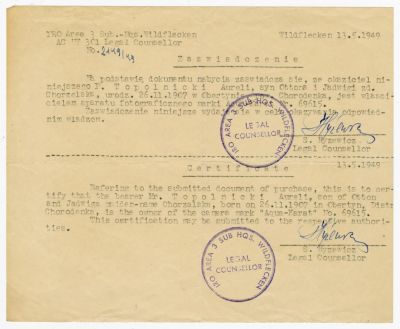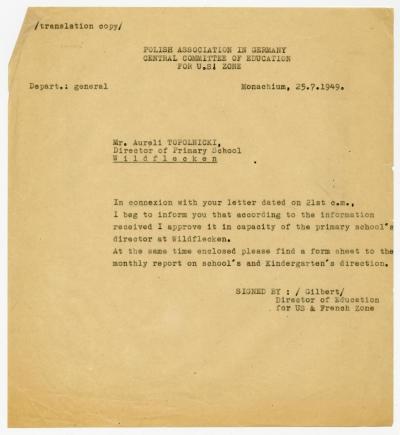The estate of Aureli Topolnicki, resident between 1945 and 1951 in the DP camp in Wildflecken (Durzyn)

The application forms for this identity card give five possible reasons for wishing to remain in Germany: 1. Political prisoner, 2. Prisoner, 3. Prisoner in a concentration camp, 4. Prisoner-of-War and 5. Deported to Germany as a civilian (this could also mean as a forced labourer, amongst others). These reasons were very important because the status of a Displaced Person and accommodation in a DP camp depended on them: not to speak of the later possibility of emigration, for example to the United States. From statements given by members of the family and the fact that Aureli Topolnicki was appointed to the post of headmaster by the German occupying powers in West Ukraine as early as September 1941, it seems highly improbably that the family were deported as forced labourers, whether in 1943 or 1944. Furthermore salary advances given in September and October 1944 by the “Alois Gasser Wholesale Iron and Locksmiths Tools” company in Retz/Lower Danube, prove that Topolnicki was indeed living and working in Retz at the time, and did not [22] travel to (or was deported to) Lundenburg in 1943, as noted in the above-mentioned identity card. In addition, Aureli Topolnicki had his teaching diploma, his certificate of appointment as a state school teacher and the report on his course of practical training as a teacher translated in Vienna in September 1944 [23], something which also shows that his everyday life in Lower Austria was subject to restrictions. Quite the opposite, he clearly hoped to be engaged in the profession for which he had trained.
On the 4. April 1945 Aureli Topolnicki – presumably with his wife and son – set off for Fleißen in the Sudetenland, where his wife had been baptised in 1915 and where she probably had relatives. The family remained there until the end of July 1945, when the campaign to expel Sudeten Germans was in full swing [24]. As a result they fled via Pilsen, Nuremberg and Bamberg to Eichstätt, where they arrived on 30. July [25]. Immediately after their arrival Aureli Topolnicki was appointed head of the school in the Eichstätt DP camp [26]. But the family left the camp once more [27] as early as 16. August for Wildflecken in Northern Bavaria, where one of the largest DP camps in the American occupying zone (indeed in the whole of Germany) was situated on site of the Rhön barracks. More importantly it’s population was mostly Polish. Two days after their arrival, on 4. July 1945, Topolnicki took up work as a secondary school teacher in Wildflecken-Durzyn [28]. The school initially comprised four age groups and 200 pupils, but this quickly rose to over 20 classes with around 800 pupils. This figure did not change greatly, despite the immensely high fluctuation in the number of teachers and pupils on the grounds of repatriation to Poland, the closure of small DP camps and the transfer of the inhabitants to larger camps like Wildflecken. That said, the amount of arrivals and departures gradually declined from 1947 onwards [29].
[22] Certificate of advance payment to Aureli Topolnicki by the “Alois Gasser Kom. Ges. Eisengroßhandlung und Schlosserwarenwerkzeug“ in Retz in September and October 1944, [Inheritance of Aureli Topolnicki, document no. 042].
[23] Certified translation of Aureli Topolnicki’s teaching diploma, dated 5.9.1944, [Inheritance of Aureli Topolnicki, document no. 097]; certified translation of the appointment of Aureli Topolnicki as a teacher, dated 5.9.1944, [Inheritance of Aureli Topolnicki, document no. 098]; certified translation of the practical examination for teachers, issued to Aureli Topolnicki, dated 5.9.1944, [Inheritance of Aureli Topolnicki, document no. 099].
[24] Handwritten notice with dates and whereabouts, [Inheritance of Aureli Topolnicki, document no. 043].
[25] Handwritten notice with travel route and dates, July 1945, [Inheritance of Aureli Topolnicki, document no. 044].
[26] Certificate on the distribution of additional food, [Inheritance of Aureli Topolnicki, document no. 007].
[27] Handwritten notice with dates and whereabouts, [Inheritance of Aureli Topolnicki, document no. 043].
[28] English language certificate issued to A. Topolnicki on his work as a teacher at the primary and secondary school in Durzyn (Wildflecken) from 18.8.1945, [Inheritance of Aureli Topolnicki, document no. 009].
[29] Report on the creation and development of the cultural, educational and organisational life of Polish DPs in Durzyn (Wildflecken), [Inheritance of Aureli Topolnicki, document no. 069]; with the start of the Cold War and the fact that several hundred thousand DPs were now regarded by the Allies as unable to be repatriated, emigration activities gradually and principally moved to overseas countries.









































![Document no. 35/1 Document no. 35/1 - Handwritten letter [in Polish] from M. Paledog from Cheltenham/England to A. Topolnicki.](/sites/default/files/styles/width_100_tiles/public/assets/images/12890-031-1a.jpg?itok=gfPskEix)
![Document no. 35/2 Document no. 35/2 - Handwritten letter from M. Paledog from Cheltenham/England to A. Topolnicki, [p. 2].](/sites/default/files/styles/width_100_tiles/public/assets/images/12890-031-1b.jpg?itok=Df4ctKpD)
![Document no. 36/1 Document no. 36/1 - Envelope to the letter [Document 35] from Paledog to Topolnicki.](/sites/default/files/styles/width_100_tiles/public/assets/images/12890-031-2a.jpg?itok=krd42nL9)
![Document no. 36/2 Document no. 36/2 - Back of the envelope to the letter [Document 35] from Paledog to Topolnicki.](/sites/default/files/styles/width_100_tiles/public/assets/images/12890-031-2b.jpg?itok=K_dTfhNe)

![Document no. 38 Document no. 38 - Topolnicki is informed about the progress of his immigration application [ assurance is recognised].](/sites/default/files/styles/width_100_tiles/public/assets/images/12890-033.jpg?itok=OKjuXvyn)
![Document no. 39 Document no. 39 - [Handwritten copy of the] birth certificate of Irma Saling, the wife of Aureli Topolnicki.](/sites/default/files/styles/width_100_tiles/public/assets/images/12890-034-1.jpg?itok=Qcvw5Oaz)











































































































































![Dokument Nr. 127/1 Dokument Nr. 127/1 - Personalausweis von A. Topolnicki mit Lichtbild und Informationen zur Person und Aussehen, zudem Information über die Deportation nach Lungenburg [Lundenburg] am 16.7.1943](/sites/default/files/styles/width_100_tiles/public/assets/images/12890-096a.jpg?itok=pKJpAuzw)
![Dokument Nr. 127/2 Dokument Nr. 127/2 - Personalausweis von A. Topolnicki mit Lichtbild und Informationen zur Person und Aussehen, zudem Information über die Deportation nach Lungenburg [Lundenburg] am 16.7.1943.](/sites/default/files/styles/width_100_tiles/public/assets/images/12890-097b.jpg?itok=RIjcT74Q)




















































